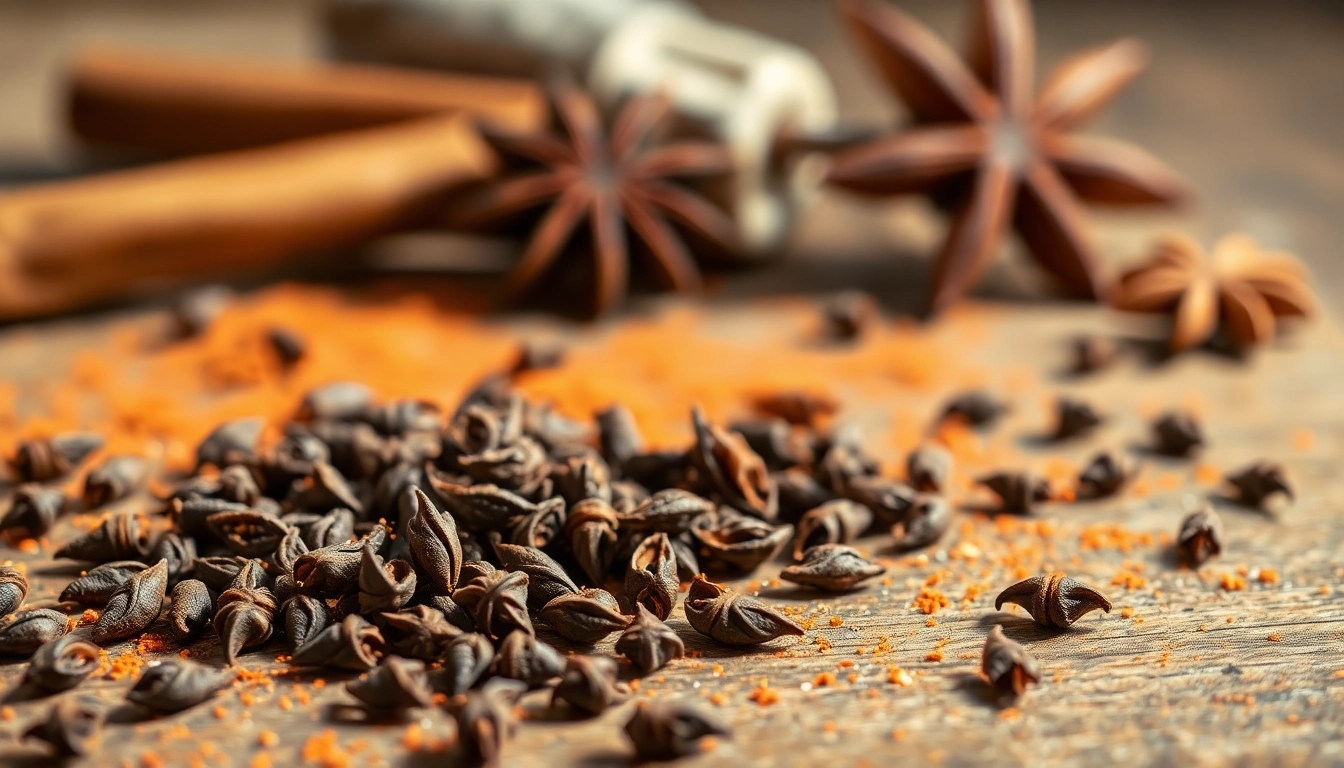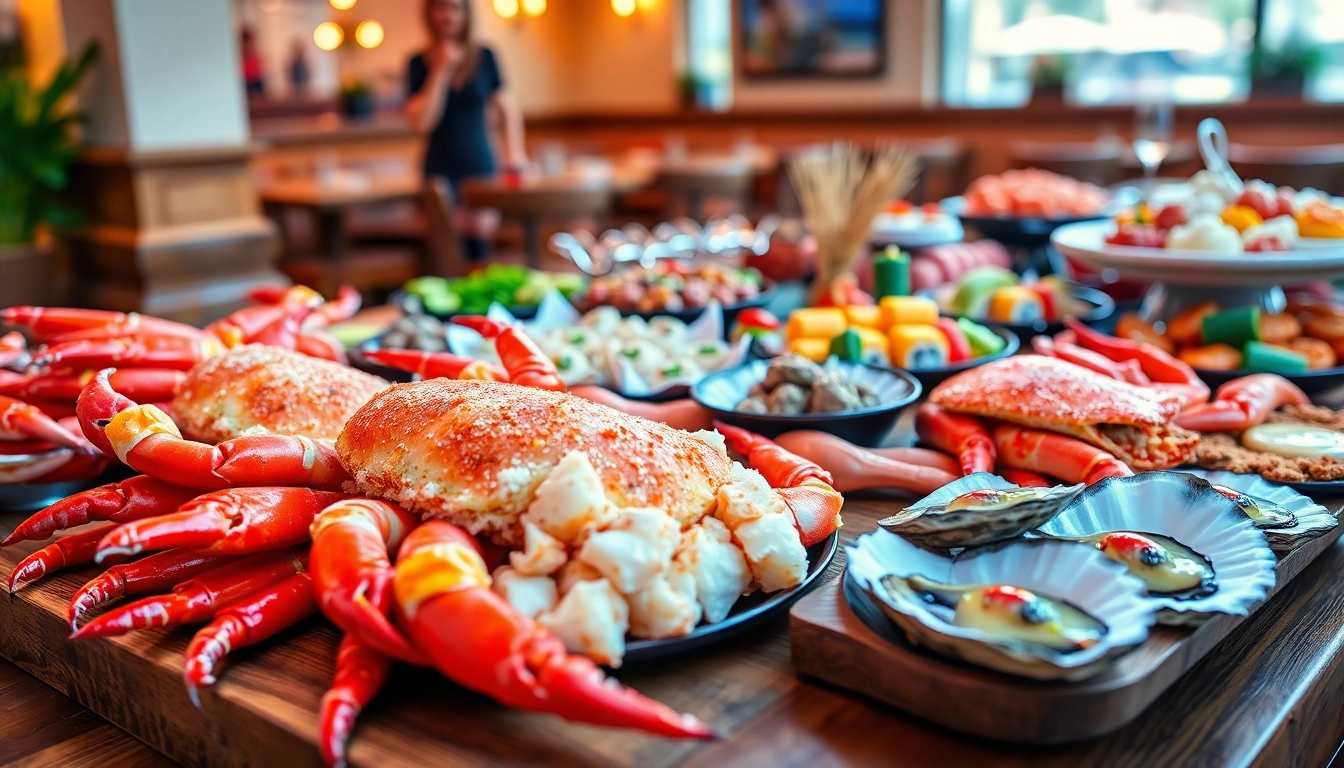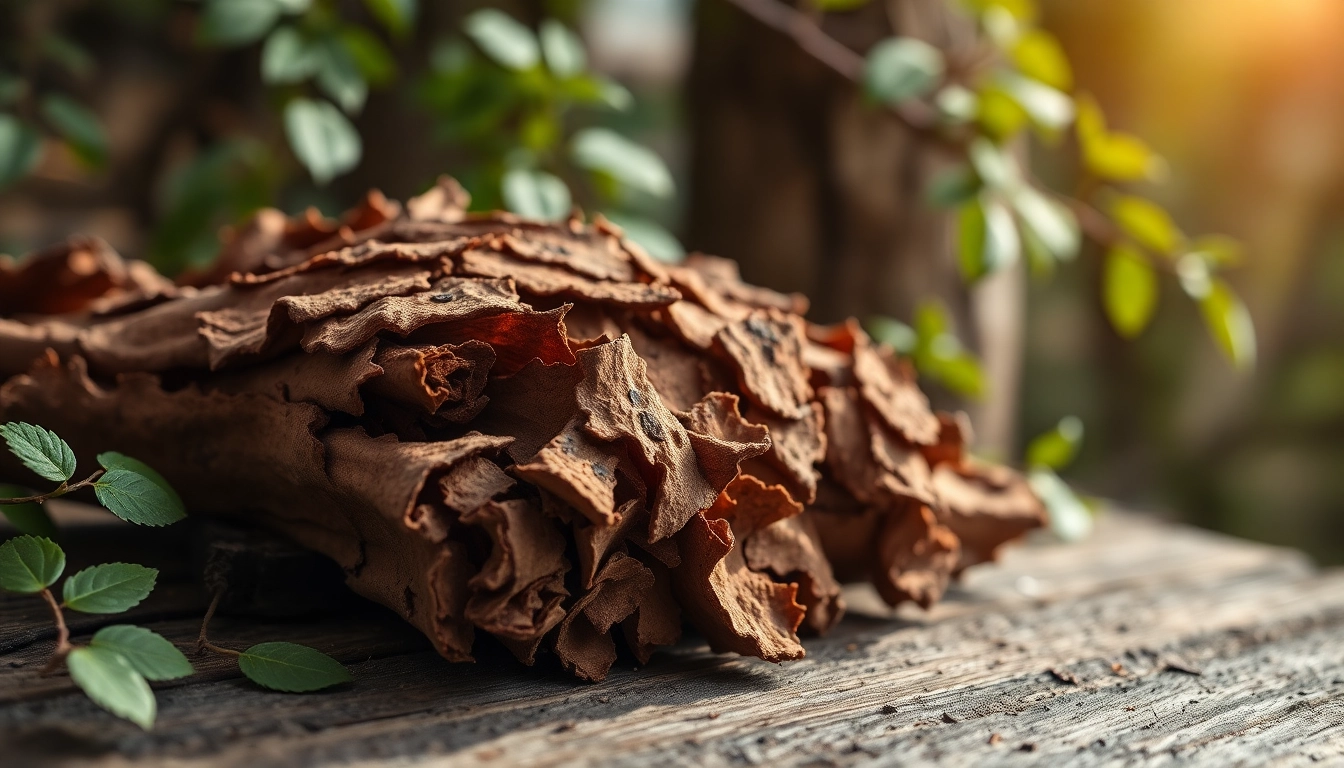1. Understanding Cloves: An Overview
1.1 What Are Cloves?
Cloves are the aromatic flower buds of the clove tree, scientifically known as Syzygium aromaticum. This species is part of the Myrtaceae family, which also includes other well-known spices like allspice and nutmeg. Originating from the Maluku Islands, also known as the Spice Islands of Indonesia, cloves are renowned for their intense flavor and distinctive fragrance. The buds, which are harvested before they open, are then dried, turning a reddish-brown color, which is signature to this essential spice. Due to their potent aroma and strong taste, cloves are commonly used in culinary applications as well as in the production of fragrances and cosmetics. You can explore the aromatic quality of cloves available for purchase at various specialty stores.
1.2 Historical Significance of Cloves
Cloves have a rich historical tapestry that dates back over 2,000 years. They were highly valued and exchanged along maritime trade routes, often considered a luxury item in the ancient world. The Chinese utilized cloves in cooking and medicine, and they were even found in the writing of Confucius. In Europe, cloves became critical during the Age of Exploration, leading to intense quests to establish dominance over the spice trade. The Portuguese and Dutch were pivotal in controlling the supply and trade routes of cloves, often leading to conflicts in their pursuit of economic gain. Their historical significance not only reflects their value as a culinary ingredient but also as a symbol of cultural exchange and globalization.
1.3 How Cloves Are Harvested and Processed
The process of harvesting cloves is meticulous. Flower buds are typically picked when they are still unopened, taking place during the dry season in regions such as Indonesia, Madagascar, and Zanzibar, where most clove trees thrive. After harvesting, the buds are laid out in the sun to dry for several days. This drying process enhances their flavor and aroma profile. Once dried, cloves are sorted and separated based on quality. Premium cloves are usually larger, plumper, and have a stronger aroma, making them more sought after in culinary and medicinal applications. The art of processing cloves has been honed over generations, ensuring that their unique properties remain intact.
2. Culinary Uses of Cloves
2.1 Incorporating Cloves into Recipes
Cloves can be a delightful addition to various recipes, adding warmth and depth to dishes. They are commonly found in spice blends, marinades, and desserts. A well-known usage is in savory dishes, especially in Indian cuisine, where they are an integral component of garam masala. Additionally, cloves can add a unique flavor to beverages such as mulled wine and chai tea. Their sweet-spicy notes enhance pumpkin and apple pie, making them staples for holiday baking. When cooking with whole cloves, it is advisable to use them sparingly due to their intense flavor. Alternatively, ground cloves can be utilized for ease of incorporation into mixtures and batters.
2.2 Cloves in Traditional Cuisines
Across different cultures, cloves feature prominently in cooking traditions. In Indian cooking, they are often paired with cinnamon and cardamom in various dishes, ranging from curries to sweet preparations. Middle Eastern cuisines utilize cloves in spiced rice dishes and meat preparations, bringing out the unique flavors of lamb and poultry. In Western cooking, they are frequently used in baking, particularly in festive recipes; for example, they are essential in creating the rich flavor of gingerbread cookies. With their versatility, cloves bridge cultural cuisines, enriching them with their distinctive aromatic properties.
2.3 Spicing Up Seasonal Dishes with Cloves
Seasonal cooking regularly celebrates the use of cloves, especially around the autumn and winter holidays. Dishes such as pumpkin soup, spiced cider, and roasted meats benefit tremendously from the addition of cloves. Their warm, fragrant character is synonymous with the cozy vibes associated with the holiday season, making them a favored choice among chefs and home cooks alike. Incorporating cloves into seasonal meals not only enhances flavors but also offers a comforting aroma revitalizing the atmosphere of festive gatherings.
3. Health Benefits of Cloves
3.1 Nutritional Profile of Cloves
Cloves are not only known for their flavor but also for their nutritional benefits. A small amount of cloves packs a punch in terms of essential nutrients. They are rich in manganese, an important mineral involved in metabolism and bone health. Cloves also provide antioxidants, fiber, vitamins C and K, and small amounts of calcium and magnesium. Despite their potent flavor, cloves are incredibly nutrient-dense, requiring only a small quantity to reap their benefits.
3.2 Cloves and Their Antioxidant Properties
Research indicates that cloves are one of the richest sources of antioxidants among spices. Compounds like eugenol not only impart flavor but also serve as potent antioxidants that combat oxidative stress in the body. These antioxidants can help neutralize free radicals, potentially preventing cellular damage and reducing the risk of chronic diseases. Regular consumption of cloves in moderation may enhance overall health, contributing to longevity and wellness.
3.3 How Cloves Can Support Digestive Health
Cloves have been traditionally used to improve digestive health. They can help stimulate the secretion of digestive enzymes, increase bile flow, and alleviate gastrointestinal discomfort. Clove oil, specifically, is commonly employed to soothe stomach aches and reduce gas. Moreover, cloves are known to have carminative properties, which can help relieve bloating and indigestion. Incorporating cloves into your diet may provide a gentle means of supporting digestive processes.
4. Essential Oil and Clove Extracts
4.1 Uses of Clove Oil in Aromatherapy
Clove oil, extracted from clove buds and leaves, is a cherished component in aromatherapy. Its warm and spicy aroma can create a calming environment, promoting relaxation. Inhalation of clove oil may alleviate feelings of stress and anxiety. Additionally, clove oil is often used in massage therapy due to its warming properties, which can improve circulation and relieve muscle tension. It is important to dilute clove oil with a carrier oil before topical application to minimize irritation.
4.2 Therapeutic Benefits of Clove Extract
Beyond its culinary applications, clove extract offers numerous health benefits. Studies suggest that eugenol, the primary compound in clove oil, has anti-inflammatory, antiseptic, and analgesic properties. This makes it a popular home remedy for dental pain, as it can help numb the affected area. Furthermore, clove extract may support immune function, fighting off infections due to its antimicrobial properties. As with any supplement or herbal remedy, it is advisable to consult with a healthcare professional before use.
4.3 Precautions When Using Clove Oil
While clove oil is beneficial, it must be used with caution. Due to its potency, excessive use can lead to irritation of the skin and mucous membranes. Individuals with pre-existing conditions, especially those involving bleeding disorders or pregnancy, should avoid using clove oil without medical advice. Additionally, clove oil should not be ingested in large amounts as it could lead to toxicity or adverse reactions. Always follow usage guidelines and consult a healthcare provider when incorporating clove oil into your wellness routine.
5. Buying and Storing Cloves
5.1 How to Select Quality Cloves
When selecting cloves, visual quality is paramount. Look for whole cloves that are plump and dark brown, with a distinct aroma. Avoid cloves that appear shriveled or have an off smell, as they may be stale. It is advisable to purchase cloves from reputable sources to ensure freshness and potency. Organic varieties may also be preferred for those seeking to avoid pesticide exposure. Whole cloves tend to retain their flavor longer than ground cloves, making them a preferable choice if you plan to store them.
5.2 Best Practices for Storing Cloves
Storage conditions greatly affect the shelf life and flavor of cloves. Store whole cloves in an airtight container, away from direct sunlight, moisture, and heat sources. A dark, cool cupboard or spice drawer is ideal. Whole cloves can retain their flavor for several years when stored properly, while ground cloves should be used within six months for optimal freshness. Regularly check the aroma and appearance of stored cloves, discarding any that have lost their potency or developed an off smell.
5.3 Exploring Clove Products: What to Look For
In addition to whole and ground cloves, there are various clove-based products available in the market, including clove oil and extracts. When exploring clove products, read labels carefully to ensure their purity and absence of additives or fillers. Essential oils should be 100% pure and preferably organic for maximum benefits. For culinary uses, consider spice blends that feature cloves as a highlighted ingredient. By seeking high-quality clove products, you can enhance both your cooking and wellness routines.



